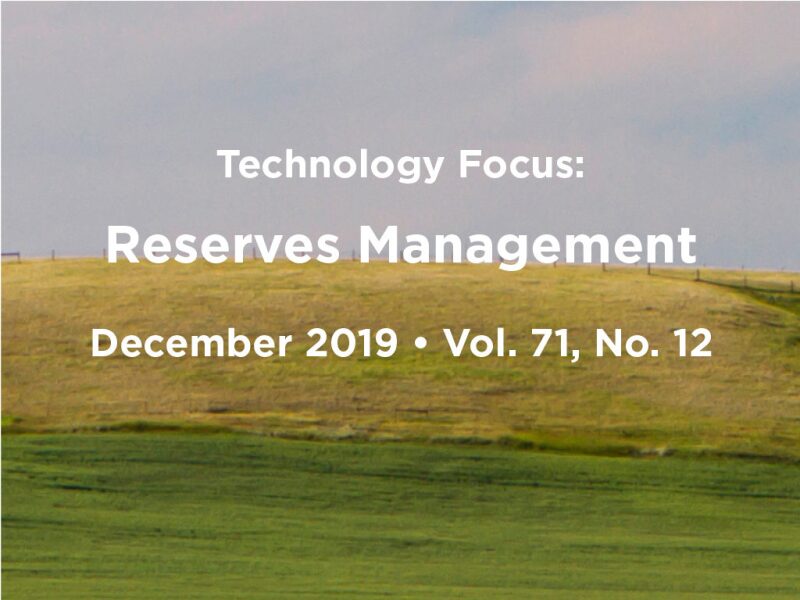Benjamin Franklin once said, “When you are finished changing, you’re finished.” Our industry must continue to improve and evolve to face the challenges of economic and commercial viability, greater transparency, environmental responsibility, and social acceptance. The papers in this month’s Reserves Management feature explore new and novel ideas to maintain social and environmental relevance, maximize value from unconventional projects, and ensure that exploration and appraisal activity is designed to optimize decision-making in resource project management.
Paper SPE 195298 describes a methodical way to show resource project movement through the recently updated (2018) Petroleum Resources Management System (PRMS) and Canadian Oil and Gas Engineering Handbook (COGEH). Not only does this facilitate a consistent approach for entities to classify their resources, but also provides guidance about how to subclassify resources through a technical and commercial analysis. Subclassification on the basis of project maturity is now recommended by the PRMS 2018 to provide greater transparency of the chance of commerciality, particularly for contingent resources. Moreover, it is important to be able to describe the associated chance of commerciality and defend the reasonableness of development assumptions and resource assignment; otherwise, projects should be considered Unrecoverable. Each entity will need to develop the process to their own specific needs.
Paper SPE 191455 is an excellent case study using data analysis to evaluate how the industry has evolved through continuous improvement over the last 12 years. The study was conducted using multivariate analysis tools to try and look objectively at the data, and with 12,000 wells to draw from, there was a significant amount of data to analyze. It is a lesson in what is required in determining the best completion technique for the right reservoir; one needs to drill a great many wells. While the study is related to improvements of projects already in the Reserves class, it illustrates the principles of the Technology Under Development process as it applies to Contingent resources.
Paper OTC 28312 is an excellent Australian example of the oil and gas industry collaborating with scientific research institutions to collect data that can be used not only to assess the integrity of subsea infrastructure to guide decommissioning strategies, but also to contribute to a broader understanding of our oceans and marine ecology. In an increasingly complex and uncertain global environment, it makes sense for oil and gas entities to look at ways of collaborating with scientific institutions and other industries for mutual benefit. This should facilitate greater community acceptance and can demonstrate that industry is undertaking responsible scientific, social, and environmental management. A win-win!
This Month's Technical Papers
PRMS Classifications: A New Methodology for Resource Inventory Management
Value of ROV Data Extends to Decommissioning Strategy
Analytical Study Examines Production of Multistage Horizontal Wells in the Bakken
Recommended Additional Reading
SPE 193717 Economic Benefits of Implementing Alternative Energy: A Heavy Oil Fields Case Study by Mohammad Al-Yatama, Kuwait Oil Company, et al.
IPTC 19506 Total Well Management: Maximizing Well Life Cycle Value—A Regulator Perspective by Ryan Guillory, Petronas, et al.

Barbara Pribyl, SPE, is reserves and resources manager at Santos. She has more than 20 years of experience as a geologist and in reserves and resources management, based in the Australian oil and gas, coal exploration, and coal-seam-gas industry. Pribyl holds an honors degree in geology from the University of Wollongong. Her focus in recent years has been on Australian and international oil and gas reserves and resources assurance and reporting. Pribyl has been a member of the SPE Oil and Gas Reserves Committee since 2014 and is the chair of the JPT Editorial Committee. She can be reached at barbara.pribyl@santos.com.

Greg Horton, SPE, is retired from Santos after 33 years of reservoir-management responsibilities and maintains an active role in improving the SPE Petroleum Resources Management System (PRMS). He holds an honors degree in civil engineering from Adelaide University. Horton was a member of the SPE Oil and Gas Reserves Committee from 2011 to 2014, is a member of the SPE PRMS Improvements Subcommittee, and serves on the JPT Review Board. He can be reached at ghortonpeteng@gmail.com.

